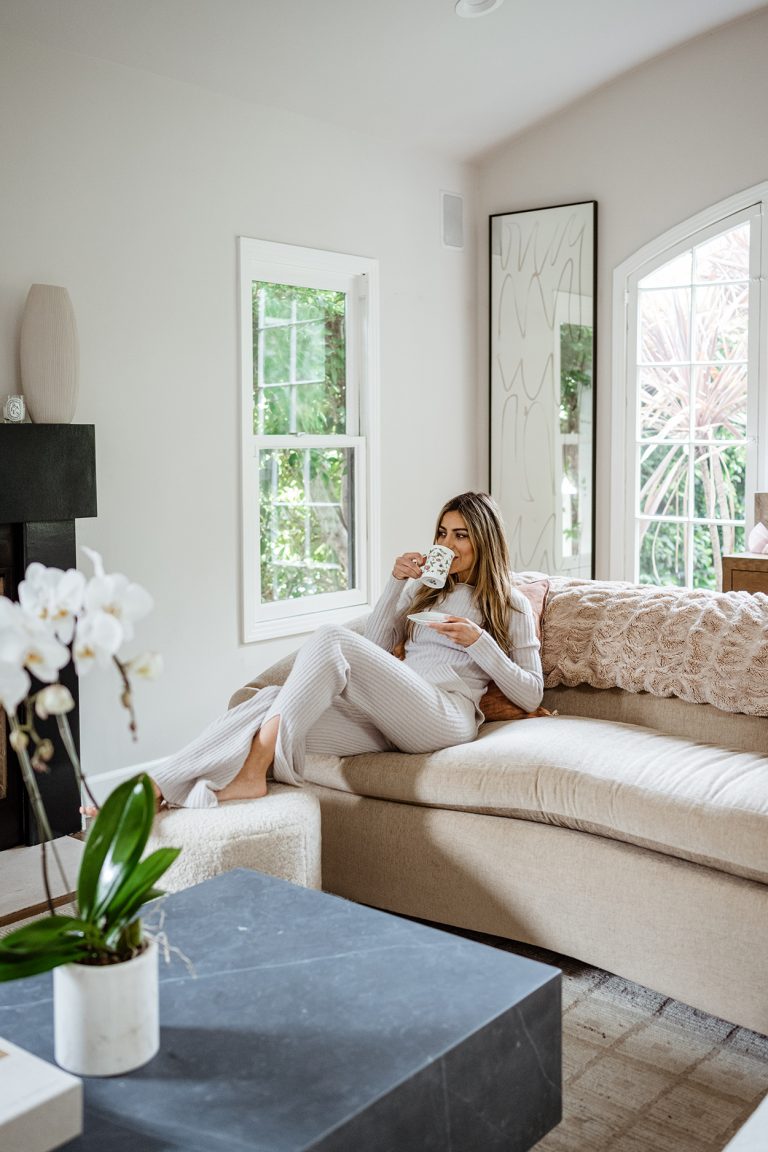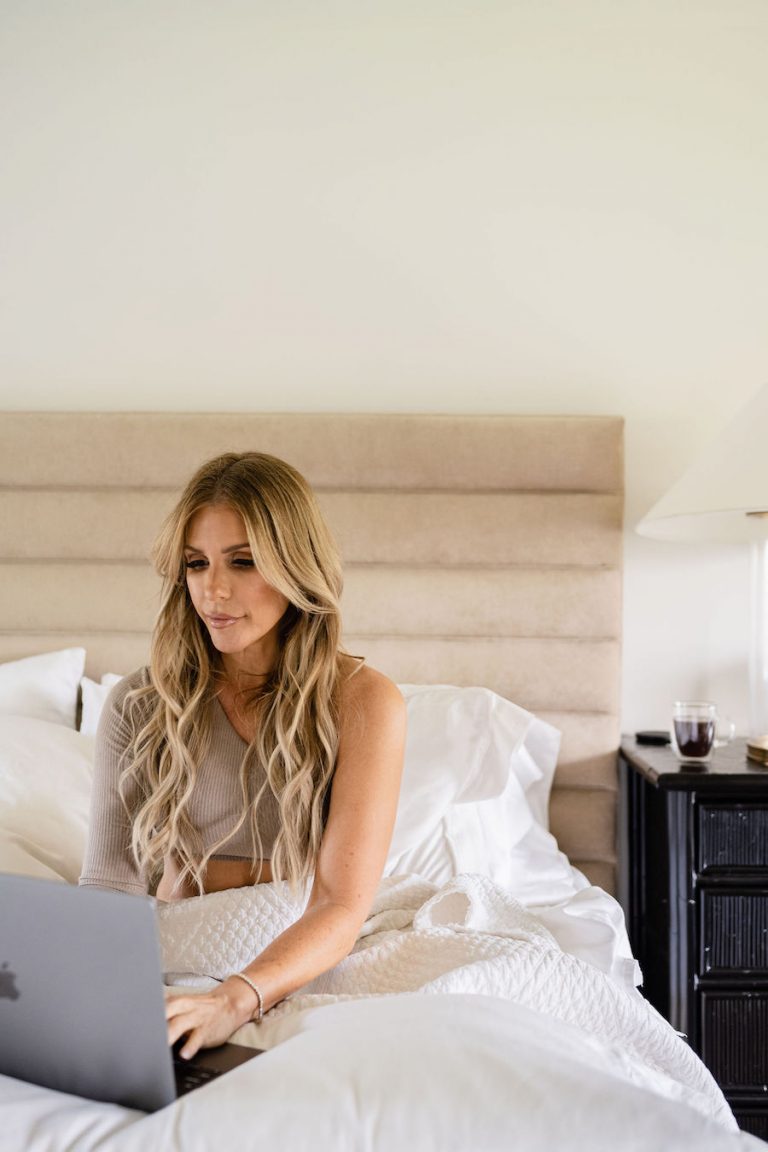I’ve long been aware of the power of a solid morning routine. When I was in college, I started the habit of getting up before my roommates so I could make breakfast and sit with my journal and something to read before rushing off for the day. I may not have fully understood it at the time, but this practice grounded me in the midst of a transitional time in my life, and I carried it with me through moving to a different state, starting my career, getting married, and having children. (That last one posed the greatest challenge to my morning routine, but motherhood made it more important than ever.) Through it all, I learned that the way we begin our day sets the tone for everything that comes after. And along the way, I’ve learned what behaviors in my life foster a successful morning routine—and which ones can sabotage it.
But first, why have a morning routine? For me, it’s about starting the day proactive rather than reactive. By intentionally setting aside this time to focus my thoughts for the day ahead, I’m prioritizing what’s most important to me and channeling my energy into that, instead of dispersing it among whatever happens to pop up throughout the rest of my day. Remember we only have a certain amount of time and energy in a day, and we can choose how we spend it. During my AM time, I frequently remind myself of this quote by John Maxwell to set the tone:
“Make each day your masterpiece.”
Convinced yet? If you’ve tried and struggled to establish a solid AM ritual, it might be that one or two behaviors are getting in the way of fully experiencing the power of this time. Scroll on for a few things that could be sabotaging yours, along with tips for a successful morning routine.
Staying Up Too Late
For me, staying up too late is the quickest way to render my morning routine powerless. I personally need a solid 7 to 8 hours of sleep in order to feel refreshed, alert, and energized, and carrying that energy into my ritual is essential for sparking creativity and being fully present. I would also lump anything into this category that results in bad quality sleep: drinking alcohol or doing social media before bed, to name a couple of the biggest offenders.
Remember that if you need to get up 30 minutes earlier than usual in order to make time for your morning routine, it will require going to bed 30 minutes earlier so you don’t sacrifice sleep in the process. Setup your “bedtime mode” on your phone and aim for consistent Z’s.
Forgetting to Prep the Night Before
A little advance planning goes a long way to removing barriers to your morning routine. My 6-year-old Henry tends to wake up really early—as in, right when I settle into my chair with coffee. Usually, he’s ready for breakfast stat, so I try to get out the ingredients the night before so that when he wakes up, it’s not a lengthy interruption to my ritual.
It’s also helpful to set aside a few minutes in the evening to decide how you want to spend your time in the morning. I keep my Vision Workbook on my desk, and once a week or so I look through it, check-in with myself on whether I’m spending my time on what’s most important, and journal about it. Or I might have a specific problem or business challenge that I want to dig into, journal about how I’m feeling, and look up some resources. The point is, by planning what I’m going to work on the night before, I don’t end up sitting with my coffee and journal, staring off into space in a half-awake state. I can dive right into whatever it is I want to get done and make the most of the first hour of my day.
Looking at Social Media Right When You Wake Up
Have you ever made a plan to work on an important project, but first you take a “quick peek” at your email, texts, or social media… and suddenly 30 minutes have gone by and you haven’t done any of what you intended? I think this is the barrier that trips up the most people, and I have certainly been there. I’ve learned the hard way that I have to practice some discipline with my inputs in order to make this time sacred. So, if you want to get the most out of your AM routine, turn off distractions and notifications, close out your email, and put away your phone. Prioritize the most important things first.
Another destructive part of looking at email or social media first thing in the morning is that it can make you reactive—seeing a certain DM or triggering post can derail your mindset within 5 minutes of waking up. Instead, I like to be proactive with the energy that I’m bringing to this part of my day. There’s power in knowing that I can choose how I want my morning routine to go.
The act of living a full life by giving time to what matters is a balancing act. Extraordinary results require focused attention and time. Time on one thing means time away from another.”
The One Thing, by Gary Keller
Procrastinating what’s most important
There’s a saying that goes, “Do the hard things first.” And setting aside time in the morning, before you’re pulled in a million directions by other peoples’ priorities, is the perfect time to do it. If there’s something important that you’ve been putting off, try doing it first thing, before anything else can get in the way. Sometimes when I’m planning the night before, I write down the one thing that is most crucial for me to get done the next day. Funny enough, it’s often something that only takes a few minutes, so carving that into my morning routine sets me up for a productive day, no matter what happens during the rest of it.
In a recent email newsletter from the writer Mark Manson, he shared what he calls the Do Something Principle. He says, “When I’m feeling unmotivated or just outright lazy, I use what I like to call “The ‘Do Something’ Principle.” It’s based on the observation that action is not just the effect of motivation, it’s also the cause of it. That is, not only do we take action when we feel motivated to do so, but taking action creates motivation to take even more action.
And so if we can just manage to do something—anything really—this almost always sets off a chain reaction where action begets motivation which begets more action which begets more motivation… and so on.
Not feeling like working out? Just put on your workout clothes. See what happens…
Not feeling like making those work calls? Just go to your desk and open up your notebook/planner and get a little more organized for the day. See what happens…
Not feeling like working on that book you’re writing? Just start on an outline for a section of a chapter. See what happens…”
Not drinking water
It may seem small or obvious, but try drinking a lot of water throughout the morning and see how much more alert and engaged you are when you hydrate first thing! I have a slightly different beverage routine than the typical “warm lemon water first thing,” mantra that most people in the wellness world swear by. When I wake up, I drink an 8-ounce cup of black coffee before any other beverages. The idea that coffee dehydrates you is a myth. Although caffeine has a mild diuretic effect, our bodies quickly compensate, so yes, coffee and tea have a net hydrating effect, not to mention a myriad of other health benefits when consumed in moderation.
Okay, climbing off my coffee soapbox, I then follow it up with a full 12-ounce glass of filtered water that I sip and refill the rest of the morning. For me, it’s all about having water right next to me at all times—I don’t even notice that I’m drinking it, but when I do, I’m more alert, and less likely to reach for random handfuls of granola for an energy boost.
So, What Are the Things that Lead to a Successful Morning Routine?
Aside from avoiding the sabotagers, there are so many proactive ways to establish a morning routine that changes your entire day for the better. Here are a few simple things that I make time for in the morning:
- Breathe. Once I settle in my chair with my coffee and journal, I start with one minute of deep, mindful breathing that grounds me and reminds me to be present.
- Prioritize your time. I read through my goals, priorities, and “people” list in my Vision Workbook to make sure that how I’m spending my time is aligned with what’s important to me. I hold them up against my calendar that day to see if my day is directed towards those priorities. If not, I find a space to carve out time for them. This could be spending one-on-one time with my kids after school, devoting a block of time for focused writing, etc.
- Create a ritual. My morning routine includes little cues that speak to my senses, reminding me to be present and acknowledge the moment as sacred. When I get up, I pour my coffee into my favorite mug, turn on a chill playlist without vocals, and light a candle that sits on my desk. The repetition of those sounds and scents reminds me to get in the zone. When my alarm goes off at 6am, I find that I’m actually excited to get into it.
I’d love to hear about your morning routine in the comments! What barriers have you run into? What practices foster a meaningful start to the day?
Share this Post
Author






